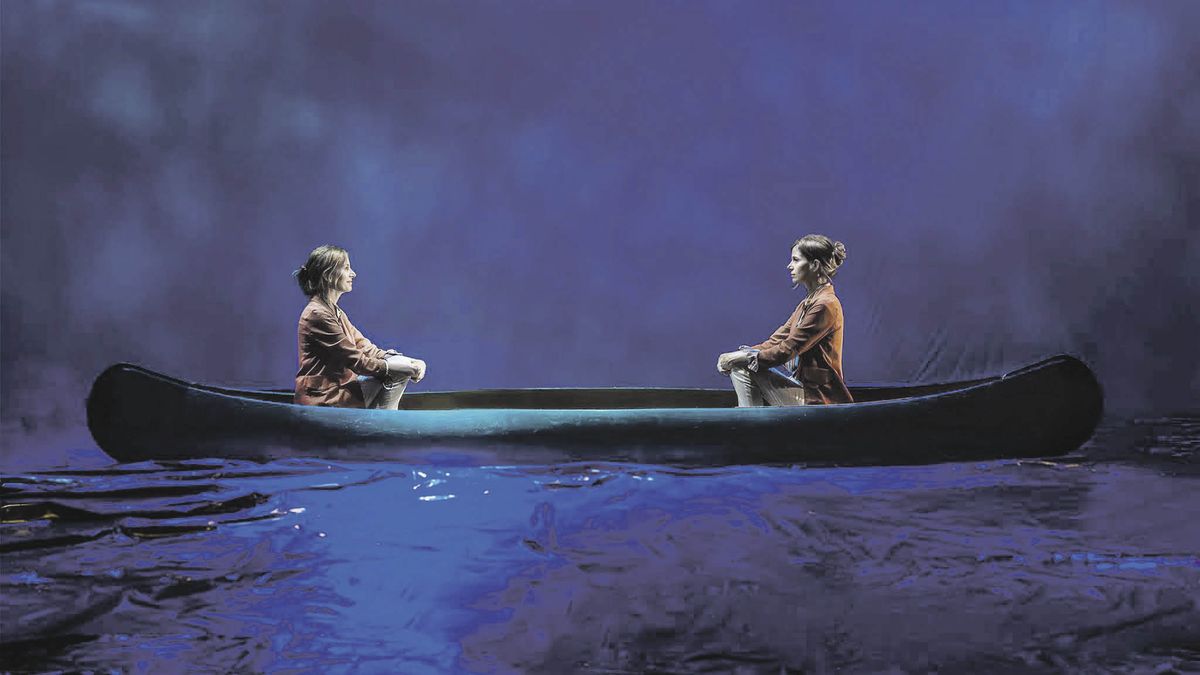March opens with a revival: “Campo minado” by Lola Arias, commissioned by LIFT and Royal Court, Theater, Brighton Festival, National University of San Martín and various European entities that gave Arias their endorsement. The play, released in 2016 and which was performed around the world, brings together Argentine and English veterans of the Malvinas War to explore, forty years later, what was left in their minds. On a film set turned time machine, former soldiers are transported back in time. The original set uses multiple languages: audiovisuals, dance, live music with veterans playing like rockers, and theater, to investigate the marks of war, the relationship between experience and fiction, and above all the distortion of memory that turns a mark into a mark or directly nullifies the memories.
In March “El colloquio de las perras”, by Hernán Gené, debuted with performances by Esther Acevedo, Amaranta Munana and Georgina Rey. Cervantes’s dogs turn into bitches, and these into women with a voice that will speak of equality and freedom.
In April “Vassa”, by Felicitas Kamien, Walter Jakob and Agustín Mendilaharzu, based on the work Vassa Zheleznova by Máximo Gorki from 1910, with Anabella Bacigalupo, Javier Pedersoli and Victoria Cipriota, will be released. The only thing that remains of the original is the overwhelming character of Vassa, a woman who raised a bunch of useless people whom she seeks to control and protect. In this version of Vassa there is a financial crisis, inflation and a social explosion. “Little Pamela” arrives, by Mariana Chaud with Marcos Ferrante, Santiago Gobernori, Iride Mockert and Lalo Rotavería, among others, with reformulated elements of Greek tragedy and a proto-mythological universe, twinned with the medieval, the villero and the glam. That month the “Julio César” by José María Muscari is released, in a fierce free version in which technology guides hidden loves and pious political lies. With Moria Casán, Marita Ballesteros, Malena Solda, Mario Alarcón, Mirta Wons and Vivian El Jaber, among others.
In May they launch “Boquitas pintadas”, another Puig in the program, but in the version of the San Martín Contemporary Ballet with adaptation and direction by Renata Schussheim and Oscar Araiz. Jean-Paul Sartre’s “The Dirty Hands” is premiered in the version of Eva Halac, which he places at the end of the Second World War, in an imaginary country and an ideological rift within the same party. That month they released “What the river does” by Paula Marull and María Marull about an overwhelmed woman who returns to her father’s town and a river that precipitates her into a transformation.
For winter holidays, Emiliano Dionisi’s “Memories at Nap Time” will return on the universe of María Elena Walsh; “El rayo verde”, by Jules Verne, by the Puppeteers of the San Martín Theater; “My imaginary gift”, by Mariano Taccagni with the direction of Pablo Gorlero on songs by Hugo Midón and Carlos Gianni, with Ana María Cores, Julián Pucheta and Belén Ucar, among others. In the theater of the Ribera. And the puppeteers will also perform “Berta, la flor”, by Myrna Cabrera, at the El Plata cinema theater.
In August comes “The Battle of the Absent” by La Zaranda, a Spanish company founded by Paco de la Zaranda, in the Regio in co-production with Teatre de Romea in Barcelona. The story revolves around survivors of a war that no one remembers.
The “Artist in residence” section will be dedicated to the poet, musician, filmmaker, author and theater director Lucía Seles. That at the Sarmiento theater he will have a workshop, a retrospective of his films and several of his works.
In September they released a new version of Lorca’s “Blood Wedding” by Vivi Tellas with Maite Lanata, María Onetto, Esteban Meloni, Luciano Suardi, Susana Pampín, Maruja Bustamante, Rita Pauls and others, at Martín Coronado. And that month comes the third of Tenconi Blanco on The European saga, “Natural Sciences”, in which the laconic German naturalist Rudolph Weiss and his romantic assistant, the Spanish Calixto Blanco, embark on a trip to South America. They will seek to find the origin of the human being in Argentina.
That month “Borkman” by Alfredo Staffolani premieres, based on Juan Gabriel Borkman by Henrik Ibsen, which in this version is set at the end of the nineties in Comodoro Rivadavia. The fall of Borkman, a financier who remains in hiding after having served time for fraud, portrays the future of certain economic policies and the end of the wage society. At the Regio theater. Lisandro Fiks’s “La gran resignation” is based on Ricardo Talesnik’s “La fiaca” and is about an employee of an advertising company who decides to rebel against the labor system. In the theater of the Ribera.
In October “Luz mala”, by Pablo Rotemberg, debuted at the Casacuberta, while “Her name means woman”, by Paola Lusardi, about a group of actors and actresses at the service of a story that questions the limits that society sets. when talking about gender identity. At the Cunill Cabanellas. The San Martín puppeteers premiered that month a play for adults, “La cantera”, by Dionisi, about a woman who takes care of an old man and keeps him awake so that he does not forget who he is. In the Regio. And “Hielo negro” by Luis Biasotto, will premiere in Sarmiento.
Source From: Ambito
David William is a talented author who has made a name for himself in the world of writing. He is a professional author who writes on a wide range of topics, from general interest to opinion news. David is currently working as a writer at 24 hours worlds where he brings his unique perspective and in-depth research to his articles, making them both informative and engaging.




